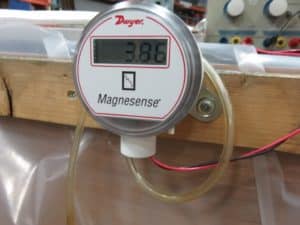ASTM F1140
Standard Test Methods for Internal Pressurization Failure Resistance of Unrestrained Packages for Medical Applications
ASTM F1140 testing is offered by Micom as part of its package testing and of its medical package testing services. This standard describes procedures to evaluate the ability of packages to withstand inner pressurization. Indeed, this method and the ASTM F2096 practice rely on the usage of a pressurization device as a means to achieve their respective goals. Moreover, this test protocol may be associated with an accelerated aging test such as ASTM F1980 in order to characterize the evolution of this attribute.
Evaluation of the inner pressurization resistance of packages:
 The aim of ASTM F1140 is to assess the ability of packages to withstand inner pressurization through the use of a burst test or of a creep test. On the one hand, a burst test consists of steadily increasing the internal pressure of the sample until it reaches failure. On the other hand, a creep test maintains a predetermined value of the inner pressure of the specimen until the latter achieves failure or for a specific amount of time. To summarize, a burst test is employed to ascertain the maximum pressure that the package can withstand before failure while a creep test is utilized to determine the capacity of the specimen to maintain its integrity for a particular time frame. Regardless of the procedure chosen, the objective is to assess the response of the package towards pressure differentials. Lastly, this standard does not provide correlations for the evaluation of the strength of the seal. Hence, other methods should be used for that purpose.
The aim of ASTM F1140 is to assess the ability of packages to withstand inner pressurization through the use of a burst test or of a creep test. On the one hand, a burst test consists of steadily increasing the internal pressure of the sample until it reaches failure. On the other hand, a creep test maintains a predetermined value of the inner pressure of the specimen until the latter achieves failure or for a specific amount of time. To summarize, a burst test is employed to ascertain the maximum pressure that the package can withstand before failure while a creep test is utilized to determine the capacity of the specimen to maintain its integrity for a particular time frame. Regardless of the procedure chosen, the objective is to assess the response of the package towards pressure differentials. Lastly, this standard does not provide correlations for the evaluation of the strength of the seal. Hence, other methods should be used for that purpose.
The main factors that are to be considered when running this test are: the rate of pressurization, the size of the packages, the sealing mechanism, the packaging material and the sensibility of the test equipment.
Typical experimental parameters for ASTM F1140 testing:
The number of samples required has to be specified. The conditioning and the test conditions have to be compliant with the ASTM D4332 practice.
Other test methods related to ASTM F1140:
For additional related test methods, please see accelerated aging tests.

